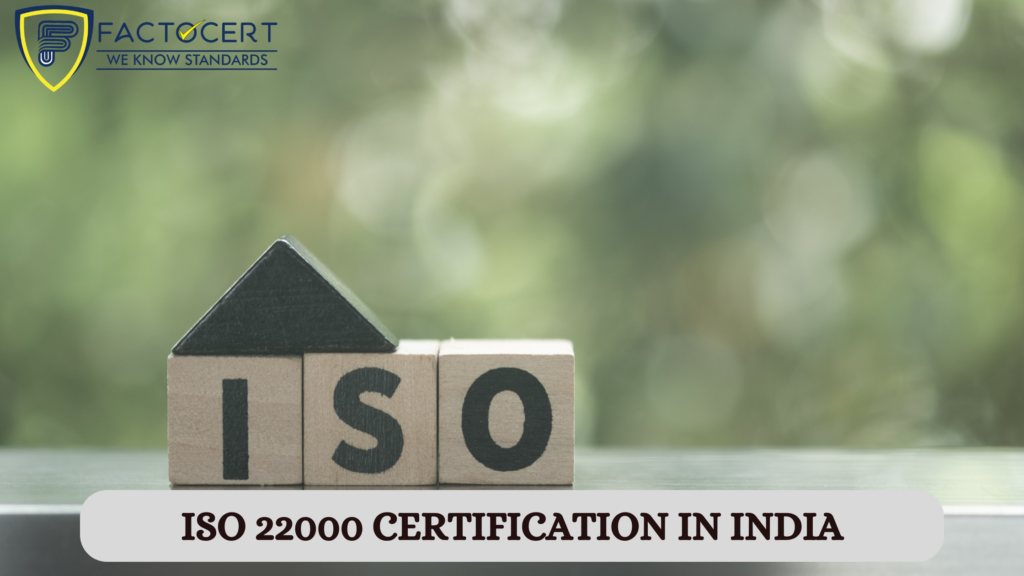Benefits of ISO 22000 certification in India
ISO 22000 Certification in India In the bustling landscape of India’s food industry, where competition is fierce and consumer trust is paramount, obtaining ISO 22000 certification in India is a pivotal milestone for any food business.
This globally recognized standard for food safety management systems ensures compliance with stringent regulations and unlocks many benefits that can significantly enhance the reputation, reliability, and competitiveness of food businesses operating in India.
- Enhanced Food Safety: At the core of ISO 22000 certification in India lies a robust framework designed to identify, prevent, and manage food safety risks throughout the supply chain. By implementing comprehensive food safety management systems, businesses can mitigate the risk of foodborne illnesses, contamination, and other hazards, thereby safeguarding the health and well-being of consumers.
- Compliance with Regulatory Requirements: In India, where food safety regulations are constantly evolving, ISO 22000 certification in India is a proactive measure to ensure compliance with national and international standards. By aligning with the requirements of regulatory bodies such as the Food Safety and Standards Authority of India (FSSAI), certified food businesses demonstrate their commitment to upholding the highest standards of food safety and quality.
- Global Market Access: In an increasingly interconnected world, access to international markets is crucial for growing and expanding Indian food businesses. ISO 22000 certification in India instills confidence among domestic consumers and opens doors to export opportunities by demonstrating adherence to globally recognized food safety standards. With certification, companies can access new markets, attract international partners, and capitalize on the growing demand for safe, quality food products.
- Enhanced Reputation and Consumer Trust: In an industry where reputation is everything, ISO 22000 certification in India is a powerful tool for building consumer trust and credibility. By displaying the ISO 22000 logo on their products, businesses signal their unwavering commitment to food safety and quality, instilling consumer confidence and fostering long-term loyalty.
- Operational Efficiency and Cost Savings: Implementing robust food safety management systems improves product quality and enhances operational efficiency across the entire value chain. By streamlining processes, reducing waste, and minimizing the risk of recalls or product withdrawals, certified businesses can achieve significant cost savings while maintaining a competitive edge in the market. ISO 22000 Certification in Singapore
- Risk Management and Continual Improvement: ISO 22000 certification in India promotes a culture of continual improvement and risk management within food businesses. By conducting regular risk assessments, audits, and reviews, certified organizations can proactively identify areas for enhancement, address potential issues before they escalate, and adapt to changing market dynamics with agility and resilience.
- Supplier and Stakeholder Confidence: ISO 22000 certification in India extends beyond the walls of individual businesses to encompass the entire supply chain. By ensuring that suppliers and stakeholders adhere to the same rigorous standards, certified companies can create a network of trust and collaboration that strengthens the integrity and reliability of the entire food industry ecosystem. ISO 22000 Certification Saudi Arabia
- Employee Engagement and Training: Engaged and well-trained employees are the cornerstone of a successful food safety management system. ISO 22000 certification in India provides a framework for training and development initiatives that empower employees with the knowledge, skills, and tools they need to uphold food safety standards, identify potential risks, and contribute to a culture of excellence within the organization.
- Sustainability and Corporate Responsibility: As consumers become increasingly conscious of environmental and social issues, ISO 22000 certification in India underscores a business’s commitment to sustainability and corporate responsibility. By minimizing waste, reducing environmental impact, and supporting ethical practices throughout the supply chain, certified companies can position themselves as leaders in sustainable food production and consumption.
Conclusion
In conclusion, ISO 22000 certification is not merely a badge of compliance but a testament to a food business’s unwavering commitment to excellence, safety, and consumer satisfaction. By embracing the principles of food safety management and investing in certification, Indian food businesses can unlock opportunities, enhance their reputation, and contribute to the growth and prosperity of the nation’s vibrant food industry.
Why Factocert for ISO 22000 Certification in India?
We provide the best ISO consultants Who are knowledgeable and provide the best solution. And to know how to get ISO certification. Kindly reach us at contact@factocert.com. work according to ISO standards and help organizations implement ISO certification in India with proper documentation.
For more information, visit ISO 22000 Certification in India.





